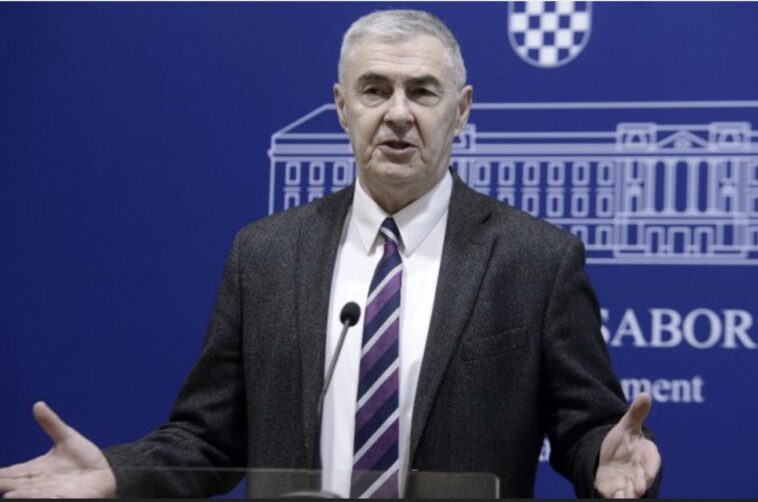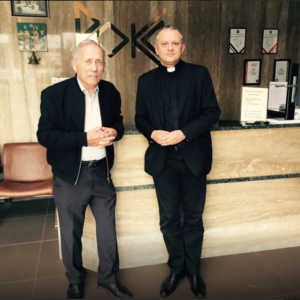“Communism is dead, but nobody has yet seen its corpse,” pronounced the first post-Soviet president of Estonia, Lennart Meri in the early 1990s (Meri 1994). For Croatia, it has taken inordinately and widely insufferably longer compared to its Central and East European counterparts to bury the body of communism. A reason behind this is undoubtedly entailed in what General Zeljko Glasnovic, who was until 18 May 2020 (when the parliament was dissolved pending new General Elections due on 5 July 2020) an Independent Member of the Croatian Parliament for Croats living in Bosnia and Herzegovina as well as in the Diaspora reiterated recently:
“… in Croatian heads the Berlin Wall has not yet fallen, we have Croatia, without Croatian content…!”
The plight for thorough and ultimate decommunisation in Croatia has become urgently valid. The past two decades of HDZ/SDP governments saw an aggressively increasing surge or resurfacing of celebrating symbols pertaining to former communist Yugoslavia. This has become an excruciatingly painful component to multitudes of Croats throughout the world as such tell-signs devalue and push into the national backburner the reality that between 1991 and 1995 an overwhelming mass of Croats fought a bloody war to achieve independence from communist Yugoslavia. The governments during this period, and indeed since Franjo Tudjman’s death in late 1999, were led by people loyal to the Communist Party of Yugoslavia regardless of whether they were its high operatives or children of those who were; resistant to change which would reveal the ugly face of corruption and theft many are often associated with.
As the Homeland War ended in 1998 (militarily in 1995 and in 1998 as part of peaceful reintegration of the remainder of Croatia’s occupied territory) there were no post-Homeland War reforms in the field of policy of memory; there were no “decommunisation” laws passed nor suggested after Franjo Tudjman’s death, which would have been the only and natural step into democracy! Judging from his speech at the inauguration of Croatia’s Parliament in 1990, had Franjo Tudjman lived after the War had ended long enough, these laws would be a reality today.
There is no doubt about that! Were Croatia’s leaders in government or at the helm of its Presidential Office not either overtly or covertly resistant to change specific Decommunisation laws would be a reality, not still a desired necessity to pursue, today!
Given that Croatia seceded from communist Yugoslavia after 94% of its voters in April/May 1991 and the bloody war of aggression ensued, one of those decommunisation laws would have been within the realm of condemnation of the communist regime and prohibition of its propaganda symbols such as the red star, such as the portrait of Josip Broz Tito, celebrating WWII Patrisan victories that ensured Croatia a continued place within the disastrous totalitarian regime of Yugoslavia, etc. Other Decommunisation laws would have been in the realm of lustration, which includes the cleansing of the public office of former communist operatives as well as cleaning the public space of Yugoslav-era legacy (e.g. renaming of streets, city squares, parks, buildings …). During the times of Franjo Tudjman’s presidency the communist names of thousands streets, squares … were changed but this was not as part of a distinctly stated decommunisation law; this was a sign of the direction Tudjman intended to take Croatia in (after the War of Independence had ended) but after his death this process was purposefully delayed and even actively thwarted and discouraged as former communists came to power.
Even as hundreds upon hundreds of mass graves with the remains of the hundreds upon hundreds of thousands of victims of communist crimes were being discovered, and still are being discovered in Croatia, resistance for decommunisation became stronger and stronger. Those politicians and ordinary people who saw decommunisation as an absolutely essential process that would open the way to the process of full democratisation suddenly were labelled as fascists or Ustashas by politicians and various “dignitaries” in Croatia whose personal curriculum vitaes are saturated with connections to the Communist Party of Yugoslavia.
In a broader perspective decommunisation is defined or seen as the process of rejection of the Communist legacy through the restructuring of the state system (including independent judiciary, checks and balances to ward off or prevent corruption…), and through changing mentality, behaviour and value systems in individual and collective dimensions. A deeper decommunisation consists in its widening of the next field: personal (lustration), educational (uncompromising and critical historical policy of the state regarding the Communist era) and the symbolic (the elimination of figures and events associated with Communism as patrons of localities, streets, squares, institutions and public places).
This year Croatia celebrates, on 30th May, 30 years since the constitution of its first multi-party Croatian Parliament and the beginning of transfer of power from Yugoslav communist regime to the independent Croatia although secession from Yugoslavia was voted in by the Croatian people at the 19 May 1991 referendum. Unlike in other former communist countries in Central and Eastern Europe the transfer of power was not peaceful and, indeed, it was thwarted by a bloody war; the transfer of power, the transfer from the communist mental chains continues to experience blockages with ugly reality largely brought on by the judicial system that has not even attempted independence from former communist operatives and associates.
Serious problems remain in Croatia as former communists and their allies render this problem almost invisible to the naked eye by devising and playing a tit-for-tat WWII Pratizans vs Ustashas political game. The reality is that the state does not function as expected by its citizens, basic institutions of administration of justice do not work as they should, the level of corruption is too high and politics while passionate operates rather as a façade, with a great deal of real activity happening behind the scenes and elsewhere. Citizens do not believe in their impact on the political processes (and they should) and plenty of them complain that the institutions of the administration of justice do not act properly – far from it.
Why did Croatia come to this?
While one would not see the reason for this through the controlled and largely biased mainstream media, which gives nor offers due regard to the politicians who constantly beat the drum of decommunisation and democratisation, a substantial number of Croatian citizens living in Croatia and abroad, as well as observers of the affairs of the country, claim that remnants of the communist past, unsatisfactory dealing with legacies from the former regime, are responsible for the contemporary dire state of affairs. Mainstream media has a great deal to answer for in this because it simply does not offer the Croatian public the variety of opinions and pursuits of politicians that people (voters) of every democracy have an absolute right to as part of democracy. It is blatantly clear that the problem of the relations between legality, the rule of law, institution building and dealing with the past in the process of transition from communism is enormous. This problem has grown roots in the failing economy and the declining standard of living despite the fact that Croatia is a member state of the European Union. The intricacies and modes of corruption that defined the former communist Yugoslavia society are deeply interwoven and rooted into the Croatian state system to this day. Safety for orderly basic livelihood with its compulsory existential markers known in developed democracies is nowhere to be seen in Croatia for the ordinary citizen: Courts are not independent, Court cases last years and years, many ten to fifteen years, wages and pensions can mainly be described as alarmingly inadequate even for basic needs for living, red tape for business enterprises is suffocating, unchecked nepotism is flourishing, corruption widespread, electoral system flawed to the point that a voter simply cannot be assured that his/her vote will go the way he/she intended …
I am quite certain that Croatians living in the diaspora or abroad see all this and suffer because of it largely because the leading politicians in the past 20 year have made them redundant for the direction Croatia is taking. Redundant they are not – they helped create the independent Croatia.
Asserting their rights to help shape Croatia into a full democracy has become a non-negotiable element in loving the Croatian homeland for Croats living abroad.
We are entering the 2020 Croatian general elections campaigns period in Croatia and abroad. A time for change is as strong today as it was in 1990. The change, decommunisation with democratisation cannot be brought about by those political parties who in the past 20 years have failed so miserably the plight of the Croatian people for full democracy; for a decent life without fear of corruption. For this I would like to remind all of the speech Franjo Tudjman made on 30 May 1990:
“… The problems facing the new government are many, complex and tangled, from local communities and municipal councils, to the Parliament, the Government and the Presidency. Within a short period, they will parallelly need to solve many problems of life’s importance which other European and Western countries solved half a century ago, or even half a millennium ago. Let’s mention only the important ones: proprietary relationships and economic life; constitutional order of pluralistic civil society with the appropriate government system modelled on countries of the free world; modernisation and revalorisation of public services, especially science and culture, teaching and education, health and social welfare, administrative services and public activities (information, journalism, Radio and TV), etc.
Numerous very complex problems have accumulated in all of these areas, and without solving them in their reciprocity there can be no exit from the crisis, or real progress…”
It is the 30th of May 2020 and these problems that needed to be solved in their reciprocity (the problems entrenched in the communist Yugoslavia regime) have not been solved. At the coming elections the more Croatian citizens both in Croatia and abroad arm themselves to vote, the better are the prospects for finally removing those problems.
Vote for change! Vote for Croatia!
Vote against those who have proven incapable of holding government that would put Croatia and Homeland War values above all else! That is the duty we all hold for a full democracy and, hence, an orderly and decent living in Croatia for all. Ina Vukic




